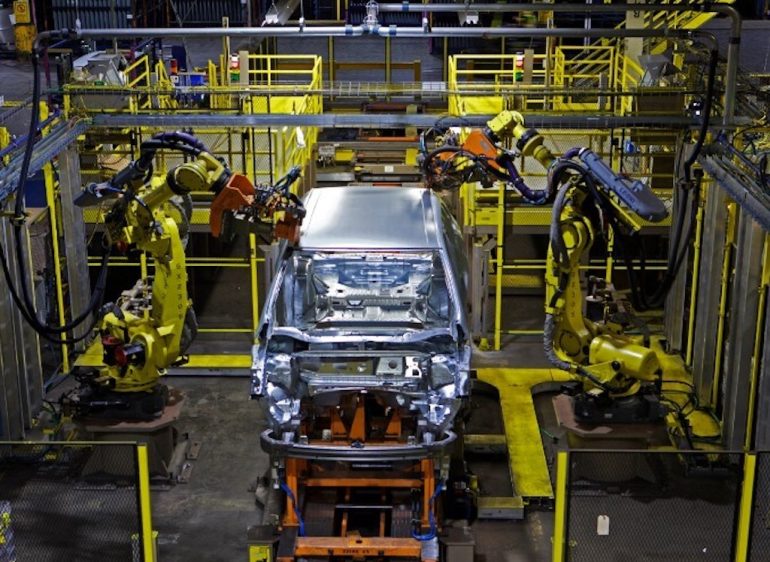How President Trump’s Tariffs on Canada & Mexico Could Reshape the U.S. Auto Industry – Automotive Addicts
Automotive
President Donald Trump has once again turned to tariffs as a policy tool, this time targeting automobile imports from Canada and Mexico with a 25% levy, alongside a 10% tariff on imports from China. These tariffs, while framed as an economic and national security measure, will have a direct impact on the auto industry in North America, where the supply chains and manufacturing is deeply interwoven. According to data from the Mexican Automotive Manufacturers’ Association and the Canadian Vehicle Manufacturers’ Association, nearly 90% of vehicles produced in those countries are exported to the U.S.–making this a high-stakes shift for automakers, suppliers, and consumers.
The Impact on Detroit and American Jobs
Few places will feel the impact of these tariffs as much as Detroit, the historic center of U.S. auto manufacturing. The Detroit Regional Chamber and its MichAuto division issued a statement warning that the tariffs could hurt Michigan’s economy, disrupt manufacturing, and increase vehicle costs for American consumers.
“Our economies are inextricably linked by manufacturing and many other critical industries,” said Glenn Stevens Jr., executive director of MichAuto. The administration is working to stop the flow of illegal drugs and immigration. However, punitive tariffs are counterproductive to commerce. The consumer will ultimately bear the cost, from showroom prices to everyday goods.”
Instead of tariffs, industry leaders are urging the administration to consider revisiting trade agreements like the United States-Mexico-Canada Agreement (USMCA) and working directly with automakers to find alternative solutions that protect jobs without stifling trade.
UAW’s Shawn Fain: Tariffs Should Protect Jobs, Not Be Used as a Political Tool
United Auto Workers (UAW) President Shawn Fain took a measured but critical stance on the new tariffs. While the union has long supported strong trade policies to protect American jobs, Fain made it clear that tying tariffs to immigration and drug policy is the wrong approach.
“The UAW supports aggressive tariff action to protect American manufacturing jobs,” Fain said in a statement. “But we don’t support using factory employees as pawns to fight over immigration and drug policy.” He also called on the administration to renegotiate trade deals like NAFTA and USMCA to further strengthen American labor protections.
Which Automakers Will Be Hit the Hardest?
According to a Reuters analysis, nearly every major automaker with operations in Canada and Mexico will be affected. Here’s how the tariffs could impact production and pricing across the industry:
BMW
BMW’s plant in San Luis Potosi, Mexico, produces the 3 Series, 2 Series Coupe, and M2, with a significant portion heading to the U.S.
The company is set to begin building its all-electric Neue Klasse models there in 2027, which could further complicate trade relations.
- Ford
- Ford operates three plants in Mexico, exporting nearly 196,000 vehicles to the U.S. in the first half of 2024.
In Canada, Ford’s Oakville assembly plant is slated to build a new gas-powered F-Series truck from 2026, a project that could now face uncertainty.
- While Ford has not issued an official statement, the company has previously expressed concerns about tariffs disrupting supply chains.
- General Motors (GM)
- GM imported approximately 750,000 vehicles from Canada and Mexico in 2024, including some of its best-selling models:
Chevy Silverado and GMC Sierra pickups
- Chevy Equinox EV and Blazer EV, both built in Mexico
- GM’s CFO Paul Jacobson stated that the company has a “playbook” to respond to tariffs, including adjusting inventory levels and shifting production if necessary.
- Honda & Nissan
- Honda exports 80% of its Mexican production to the U.S. and has warned it may reconsider manufacturing investments if tariffs remain.
Nissan builds the Sentra, Versa, and Kicks in Mexico and produced over 500,000 vehicles there in the first nine months of 2024.
- Toyota
- Toyota’s Tacoma pickup truck is exclusively built in Mexico, with over 230,000 units sold in the U.S. in 2023.
The 25% tariff could lead to significant price hikes or production adjustments.
- Stellantis (Chrysler, Jeep, Ram, Dodge)
- Stellantis has two assembly plants in Mexico producing the Jeep Compass and Ram trucks.
In Ontario, Canada, Stellantis’ Windsor and Brampton plants are undergoing retooling, with future models potentially impacted by the tariff decision.
- Volkswagen & Audi
- Audi’s Q5 SUV, built in San Jose Chiapa, Mexico, saw nearly 40,000 units exported to the U.S. in the first half of 2024. A 25% tariff could make these models significantly more expensive.
Volkswagen’s massive Puebla, Mexico plant, which produces the Jetta, Tiguan, and Taos, will also be affected.
- What Happens Next?
- While automakers scramble to assess the impact, one thing is clear: these tariffs will drive up costs, with consumers likely paying more for vehicles in the near future. Industry experts predict:
Higher Prices: A 25% tariff on vehicles from Canada and Mexico could add thousands of dollars to the cost of some models.
Production Shifts: Some automakers may move production back to the U.S., but this process takes years and requires major investment.
- Political & Legal Challenges: Expect pushback from Congress, trade groups, and even automakers themselves, possibly leading to new negotiations.
- With the 2024 election cycle in full swing, the tariff debate is far from over. With the 2024 election cycle in full swing, the tariff debate is far from over.
Follow us today:


